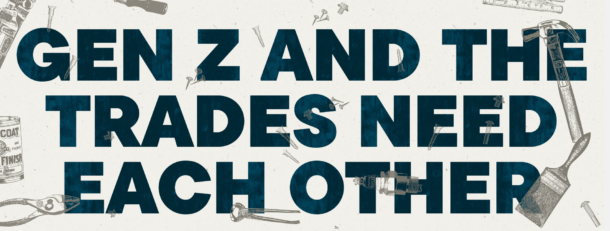SkillsUSA National Signing Day … Students like Jacob Jackson, who grew up working beside his dadSkillsUSA National Signing Day … Students like Julia Warren, who found her calling through sheet metal and physics…And special guests like Sam Darnold, who knows the value of the trades firsthand The Lowe’s Foundation recently celebrated a record-setting SkillsUSA National Read more
Gen Z

Table of Contents
The Lowe’s Foundation recently celebrated a record-setting SkillsUSA National Signing Day in style as over 3,500 students nationwide said “yes” to skilled trades careers and apprenticeships. This included five “blue carpet” ceremonies at Lowe’s stores to cheer on these students alongside their families, future employers, SkillsUSA advisers and NFL quarterback Sam Darnold.
The perception of blue-collar careers is undergoing a generational transformation. More Gen Z students are choosing purpose-driven, skills-based paths over traditional four-year degrees—reflected in the surging enrollment at community and technical colleges nationwide. This shift isn’t happening in isolation. It’s often powered by the encouragement of parents who recognize the value, stability and opportunity these careers provide — no longer a “plan B” but an intentional path forward. Especially among SkillsUSA student signers, the support of their parents has been instrumental. Their stories reflect a cultural shift. More than ever, they view skilled trades as a strategic and purpose-driven career choice.

SkillsUSA National Signing Day … Students like Jacob Jackson, who grew up working beside his dad
Jacob, a high school senior who walked the blue carpet in Seattle, plans to attend Universal Technical Institute to pursue a career in HVAC technology and start his own business.
“Working with my dad and growing up in the trades has given me the opportunity to meet tons of people in the industry,” Jacob said. “Almost all of them said it’s the way to go.”
His father, Daniel, said, “I work in the skilled trades and couldn’t be happier with (Jacob’s) choice. Without the trades, we wouldn’t have the infrastructure that folks rely on every day. Jacob’s interest in HVAC combines knowledge of electrical, plumbing, engineering; it’s a well-rounded trade.”
SkillsUSA National Signing Day … Students like Julia Warren, who found her calling through sheet metal and physics
Julia, a student from Washington, is pursuing an HVAC apprenticeship through the Western Washington Sheet Metal JATC (Joint Apprenticeship and Training Committee). Initially on a college-bound engineering track, she found her passion after being placed in a woodshop class and fell in love with the craft.
“I find the material, benefits and wage to be the most appealing as a promising career path,” Julia explained.
Her mom, Kathy, has seen her daughter’s confidence soar.
“My daughter is an excellent student; not much has changed there. But I have noticed she has taken more of a liking to physics and math, and is willing to do trial and error on projects,” Kathy said. “My daughter was thinking about going to college to become an engineer. But after she did the pre-apprenticeship for the sheet metal union, she felt this was a better fit.”

…And special guests like Sam Darnold, who knows the value of the trades firsthand
At the Seattle Lowe’s #2734 (3511 5th Street SE, Puyallup, WA 98374), students were joined by a surprise guest — NFL quarterback Sam Darnold, who took a moment to speak to the crowd.
His message was simple but powerful:
These jobs are the backbone of our communities, and the people who do them deserve a whole lot more recognition. These students are stepping into a future that’s not only bright but absolutely vital to our communities.”
Sam’s father recorded a special message congratulating the student signers:
“I’ve been a medical gas plumber for nearly 30 years. I want to start off by congratulating the SkillsUSA students on their commitment to skilled trades careers this month. We need you. As I look back on my experience as a tradesperson, I found an extreme source of pride in providing products and services to countless hospitals and medical facilities over the years.”
“I took pride in my dependability – being early, willing to stay late, doing whatever it took to finish the job right. This mindset made me a valuable contributor for my company and customers, which became an example to both of our children, as we witnessed in Sam’s athletic career over the years. Again, I wish you all the same success and rewards that I’ve experienced in the trades. It’s a journey well worth traveling.”
As students like Jacob and Julia sign for success on SkillsUSA National Signing Day, they’re redefining what success looks like.
It’s a movement—and it’s just getting started.
Since 2023, the Lowe’s Foundation has awarded over $34 million in Gable Grants to over 50 organizations across the nation offering innovative skilled trades training. Through these grants, program participants are strengthening their skills in carpentry and construction, HVAC, electrical, plumbing and appliance repair.
To learn more about the Lowe’s Foundation, visit Lowes.com/Foundation and follow on Instagram, Facebook and LinkedIn.
For more info on SkillsUSA, https://mechanical-hub.com/2024-skillsusa-plumbing-championship-winners/

Even as concern around white-collar jobs grows due to AI and economic uncertainties, Jobber’s report reveals hesitancy among Gen Zs to pursue trades careers Jobber, the leading provider of home service software, today released The Annual Blue-Collar Report: Gen Z and the Trades Need Each Other. The report, based on survey responses from 1,000 students in the Read more
Even as concern around white-collar jobs grows due to AI and economic uncertainties, Jobber’s report reveals hesitancy among Gen Zs to pursue trades careers

Jobber, the leading provider of home service software, today released The Annual Blue-Collar Report: Gen Z and the Trades Need Each Other. The report, based on survey responses from 1,000 students in the U.S. aged 18-20, provides insight into how Gen Z navigates education and career choices, as well as offers solutions on how to inspire and encourage younger generations to consider taking advantage of all that blue-collar careers have to offer.
According to The Annual Blue-Collar Report, 76% of Gen Zs agree there is a stigma associated with going to vocational school over a traditional four-year university. This reality threatens our homes, economy, and the livelihoods of younger generations.
“If you own a home, you have a problem,” warns Sam Pillar, CEO and co-founder of Jobber. “While there is some renewed interest among the younger generation to pursue blue-collar careers, there’s still far too much work homeowners need done, and not enough workers to do it. We need to do a better job showing Gen Z how incredible the opportunities in the trades are, and encouraging them to consider that path.”
The U.S. housing stock is aging rapidly, with the median age of homes reaching 40 years. This is a critical problem as the U.S. is experiencing a labor shortage across most industries as labor force participation declines and the workforce ages and retires. In addition, the U.S. Bureau of Labor Statistics states that employment demands in trade industries are often greater than or pacing the 3% average of all occupations, representing not just a gap, but a growing chasm.
Key findings from the report provide deeper insights into why Gen Z is not pursuing blue-collar careers and how society can encourage younger generations to consider them. Despite the growing stigma and misconceptions that Gen Z has, The Annual Blue-Collar Report clearly shows that they actually do want blue-collar careers, and just don’t know it yet.
The “American Dream” needs a blue-collar rebrand
Gen Z has been taught to measure success through a white-collar lens, but AI, the economy, and layoffs are changing their minds. Their concerns around white-collar careers are clear.
- One-third (33%) of Gen Z say that white-collar desk jobs are less stable today than they were for their parents’ generation.
- 41% of Gen Z agree that the potential for AI to replace jobs has made it harder to achieve the “American Dream” and 46% believe there will be fewer future job opportunities as a result.
- 70% of Gen Z say they are not optimistic about the future of the economy.
- When asked what would make a trade career more appealing, Gen Z described what blue-collar professions already offer, including flexible work hours (73%), job stability (61%), and overtime pay (58%).
Gen Z’s biggest career influences are letting them down
Parents have blue-collar blindness, schools deserve a failing grade for blue-collar education, and Hollywood is doing hard work dirty.
- Family (51%) was identified as the biggest influence on Gen Z and the careers they chose to pursue by a significant margin.
- 61% of Gen Z say their parents haven’t spoken to them about vocational school or told them not to consider it.
- Just 17% of Gen Z say they have been educated on the benefits of vocational training following high school graduation. This was significantly lower than bachelor’s degree, community college, military service, and entrepreneurship.
- More than a third (35%) of Gen Z say television shows and movies have influenced the careers they want to explore and 47% describe trade professionals as being generally portrayed negatively (incompetent, unhealthy, and/or unhappy) in shows and movies.
We simply need more women in the trades
While many workforces have evolved to accommodate the modern gender distribution of labor, the trades have yet to establish this balance.
- Nearly half (48%) of Gen Z agree that women are discouraged from pursuing trade careers from a young age.
- 58% of Gen Z say that women face more discrimination within trade careers—compared to other career options—with the majority of women (68%) believing this compared to men (47%).
In addition to survey data and insights, The Annual Blue-Collar Report offers testimonials from people like 27-year-old commercial and residential electrician, Lexis Czumak-Abreu, who attests to the benefits of blue-collar work: “I studied pre-med in school, intending to become a surgeon but decided to become an electrician instead. Many people in my family are electricians, including my dad. The salary is great, the hours are stable, and the work is very gratifying!”
Finally, The Annual Blue-Collar Report highlights 10 specific calls to action for the general public, blue-collar professionals, policymakers and educators, and the media to help connect the dots between Gen Z’s fears and desires and the blue-collar opportunity in front of them, as well as eliminate the existing harmful stereotypes.
To access The Annual Blue-Collar Report Powered by Jobber, visit jobber.com/blue-collar.
